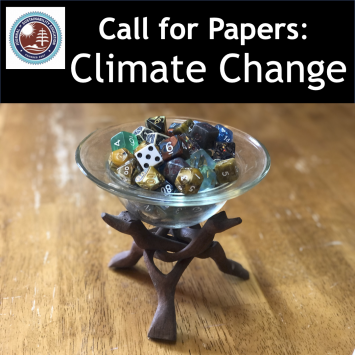2021 Call for Papers: Climate Change: Resistance, Recuperation, Resilience
JSE Call for Papers-June 2021 Special Issue Climate Change
In November, the U.N. will hold another climate change conference in Scotland, as it has done for the last quarter century. Numerous reports detail the climactic devastation that is already unfolding, from the Intergovernmental Panel on Climate Change (2018), to the World Economic Forum Report (2020), to the recent research summary and perspective in The Frontiers in Conservation Science (2021).
Donna Haraway, in Staying with the Trouble: Making Kin in the Chthulucene (2016), wrote,
What if the doleful doings of the Anthropocene and the unworldings of the Capitalocene are the last gasps of the sky gods, not guarantors of the finished future, game over? It matters which thoughts think thoughts. We must think!
What will it take to create a transformation in human society to coexist with our human and more-than-human earth kin? For this special issue on Climate Change, we seek academic literature, personal essays, media, and other publishable works that address these questions:
- How do we unpack with our students the ontologies and epistemologies that limit human ability to address our behavior within nature that has led to climate change, global biodiversity loss, and other damage?
- How do we address climate change in the context of social justice, from decolonizing our thinking to Black Lives Matter?
- What does multi species environmental justice look like?
- What case studies point to creative community solutions to carbon sequestration?
- How do we as educators address loss with our students?
- What examples can we celebrate of indigenous resistance to ecological and cultural destruction? How can we be allies to those resistances?
- What have we learned from Covid-19 responses about working together, privilege, economic entanglement, human identity, and learning that might apply to climate change?
- How do we teach multi-generational responsibility and future-casting?
- What does “staying with the trouble” look like in our practices as researchers and scholars?
Ursula LeGuin, in her speech, “Freedom” (2014) said,
Hard times are coming, when we’ll be wanting the voices of writers who can see alternatives to how we live now, can see through our fear-stricken society and its obsessive technologies to other ways of being, and even imagine real grounds for hope. We’ll need writers who can remember freedom —poets, visionaries— realists of a larger reality.
The editors of this special issue ask these questions and explore these key ideas in an effort to stimulate research, reflection, theory development, and discussion of praxis. We also seek relevant book and media reviews, editorial pieces, photo essays, multimedia pieces, case studies, and reflections on learning and practice.
SUBMISSION DEADLINE: March 20, 2021
EXPECTED PUBLICATION: June, 2021
If you are interested in submitting work for this issue, please visit the JSE website (www.susted.org), and register as an author using the RATS (review and article tracking and submission) system (follow the link to RATS at the top of the JSE home page). RATS also includes links to the JSE submission guidelines (select “submit” from the RATS interface). For further information, please contact the issue editor. Please use “JSE Climate Change Issue inquiry” in the subject line of your message.
The JSE also seeks peer reviewers. You are encouraged to use the RATS system to participate in our peer review process.
Clare Hintz, Ph.D., Editor, editor@susted.com
Categories for Authors:
Scholarly Feature Articles: Longer, peer-reviewed articles between 3,000 and 7,500 words in two categories: (1) Original Research, and (2) Theoretical/Conceptual Articles.
Reports and Briefings: Report preliminary findings, phenomenological studies, case studies, insights, etc. between 500-3,000 words and have fewer than 10 references.
Editorials/Opinions: These 500-3,000 word essays offer commentary on current events related to sustainability education, issues in sustainability, or recent articles in this journal.
Book and Media Reviews: Reviews are between 500 and 3,000 words that focus on how the book, film, or other media contributes to sustainability education.
Case Studies: Descriptions of community initiatives, courses, programs or experiences with students with enough detail to visualize how the initiative, experience, or course was done, but leaving enough of an open framework to allow the reader to envision using and adapting the model.
Photo Essays and Images of Sustainability Education: Digital photographs or other media with 100 word maximum captions help demonstrate a more holistic view of sustainability education and engage a broad audience.
Sustainability Journeys: These are personal stories about some poignant aspect of the author’s journey to be, or to be part of, sustainability education.
Author Guidelines:
http://www.susted.com/wordpress/aboutus/submission-guidelines/
Style requirements: Please ensure submissions comply with APA style as well as the Journal of Sustainability Education’s specific style and submission guidelines.
About the Journal of Sustainability Education: The Journal of Sustainability Education (JSE) serves as a forum for academics and practitioners to share, critique, and promote research, practices, and initiatives that foster the integration of economic, ecological, and social-cultural dimensions of sustainability within formal and non-formal educational contexts. JSE is a peer-reviewed, open access trans- and interdisciplinary e-journal that publishes three editions a year: two themed issues and one general issue. Issues include research and practice feature articles, professional and news reports of projects and initiatives, opinion pieces, announcements of educational and research opportunities, and book and other media reviews. JSE is housed by Prescott College’s Ph.D. Program in Sustainability Education.











